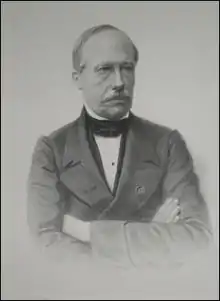Charles de Brouckère
Jonkheer Charles Joseph Marie Ghislain de Brouckère (French pronunciation: [ʃaʁl ʒozɛf maʁi ɡilɛ̃ də bʁukɛʁ]; 18 January 1796 – 20 April 1860) was a Belgian nobleman and liberal politician.
Charles de Brouckère | |
|---|---|
 | |
| Mayor of Brussels | |
| In office 1848–1860 | |
| Preceded by | François-Jean Wyns de Raucour |
| Succeeded by | André-Napoléon Fontainas |
| Personal details | |
| Born | Charles Joseph Marie Ghislain de Brouckère 18 January 1796 Bruges, Austrian Netherlands |
| Died | 20 April 1860 (aged 64) Brussels, Belgium |
| Nationality | Belgian |
| Political party | Liberal Party |
| Alma mater | Université libre de Bruxelles (honorific) |
| Occupation | Politician, nobleman |
Born in Bruges, elder brother of future Prime Minister of Belgium Henri de Brouckère, Charles entered politics in the period when modern Belgium formed the southern part of the United Kingdom of the Netherlands. He worked as a banker in Maastricht and served as a representative for the province of Limburg in the Second Chamber of parliament.
During the Belgian Revolution of 1830, De Brouckère was among the francophile, francophone party which favoured annexation by France. In the newly independent Belgium, he served as Finance minister, Interior Minister, and War Minister, for short periods in 1831. He taught as a professor at the Université Libre de Bruxelles, and in 1848 became mayor of the City of Brussels, a post he held continuously until his death. He is interred at Brussels Cemetery.
De Brouckère was responsible for major urban renewal in Brussels, including the creation of water mains, as well as the first boulevards in the city. Today, the Place de Brouckère/De Brouckèreplein, and De Brouckère station, in central Brussels, are named after him.
Honours
.svg.png.webp) Belgium: Iron Cross.
Belgium: Iron Cross..svg.png.webp) Belgium: Grand Officer in the Order of Leopold
Belgium: Grand Officer in the Order of Leopold
Sources
- Du Bois, A., Les Bourgmestres de Bruxelles. Ch. de Brouckère, in : Revue de Belgique, mei 1896, pp. 21–41.
- Juste, Théodore, Charles de Brouckère, Brussel, C. Muquardt, 1867, p. 131.